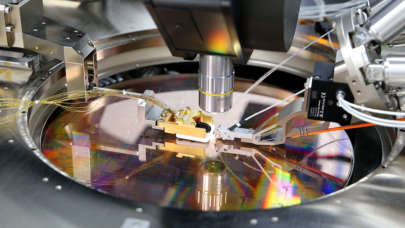
PsiQuantum’s Path to 1 Million Qubits
April 21, 2022
PsiQuantum, founded in 2016 by four researchers with roots at Bristol University, Stanford University, and York University, is one of a few quantum computing startups that’s kept a moderately low PR profile. (That’s if you disregard the roughly $700 million in funding it has attracted.) The main reason is PsiQuantum has eschewed the clamorous public chase for... Read more…

GlobalFoundries Has Started Its IPO Process – Here’s What’s Next
October 5, 2021
Since July, semiconductor maker GlobalFoundries has been the subject of rumors and news reports that said the company was the takeover target of market leader I Read more…

GlobalFoundries Reportedly Files for IPO, Countering Intel’s Acquisition Interest
August 19, 2021
In July, reports that Intel is pursuing a $30 billion acquisition of chip fab operation GlobalFoundries threw the chip market into a tizzy, with Intel declining Read more…

AMD, GlobalFoundries Commit to $1.6 Billion Wafer Supply Deal
May 13, 2021
AMD plans to purchase $1.6 billion worth of wafers from GlobalFoundries in the 2022 to 2024 timeframe, the chipmaker revealed today (May 13) in an SEC filing. In the face of global semiconductor shortages and record-high demand, AMD is renegotiating its Wafer Supply Agreement and bumping up capacity. Read more…

HPC Career Notes: November 2019 Edition
November 4, 2019
In this monthly feature, we’ll keep you up-to-date on the latest career developments for individuals in the high-performance computing community. Whether it� Read more…

GlobalFoundries Drops 7nm Development Program
August 29, 2018
Under the new leadership of CEO Tom Caulfield, custom semiconductor manufacturer GlobalFoundries has announced the seemingly sudden decision to drop its 7nm FinFET development program and restructure its R&D teams to support what the company calls its “enhanced portfolio initiatives.” In part, this will result in a workforce reduction of approximately 5 percent (of roughly 18,000 employees), though GlobalFoundries said “a significant number of top technologists will be redeployed on 14/12nm FinFET derivatives and other differentiated offerings.” Read more…

GlobalFoundries, Ayar Labs Team Up to Commercialize Optical I/O
December 4, 2017
GlobalFoundries (GF) and Ayar Labs, a startup focused on using light, instead of electricity, to transfer data between chips, today announced they've entered in Read more…

GlobalFoundries Puts Wind in AMD’s Sails with 12nm FinFET
September 24, 2017
From its annual tech conference last week (Sept. 20), where GlobalFoundries welcomed more than 600 semiconductor professionals (reaching the Santa Clara venue� Read more…

- Click Here for More Headlines

Whitepaper
Transforming Industrial and Automotive Manufacturing
In this era, expansion in digital infrastructure capacity is inevitable. Parallel to this, climate change consciousness is also rising, making sustainability a mandatory part of the organization’s functioning. As computing workloads such as AI and HPC continue to surge, so does the energy consumption, posing environmental woes. IT departments within organizations have a crucial role in combating this challenge. They can significantly drive sustainable practices by influencing newer technologies and process adoption that aid in mitigating the effects of climate change.
While buying more sustainable IT solutions is an option, partnering with IT solutions providers, such and Lenovo and Intel, who are committed to sustainability and aiding customers in executing sustainability strategies is likely to be more impactful.
Learn how Lenovo and Intel, through their partnership, are strongly positioned to address this need with their innovations driving energy efficiency and environmental stewardship.
Download Now
Sponsored by Lenovo
Whitepaper
How Direct Liquid Cooling Improves Data Center Energy Efficiency
Data centers are experiencing increasing power consumption, space constraints and cooling demands due to the unprecedented computing power required by today’s chips and servers. HVAC cooling systems consume approximately 40% of a data center’s electricity. These systems traditionally use air conditioning, air handling and fans to cool the data center facility and IT equipment, ultimately resulting in high energy consumption and high carbon emissions. Data centers are moving to direct liquid cooled (DLC) systems to improve cooling efficiency thus lowering their PUE, operating expenses (OPEX) and carbon footprint.
This paper describes how CoolIT Systems (CoolIT) meets the need for improved energy efficiency in data centers and includes case studies that show how CoolIT’s DLC solutions improve energy efficiency, increase rack density, lower OPEX, and enable sustainability programs. CoolIT is the global market and innovation leader in scalable DLC solutions for the world’s most demanding computing environments. CoolIT’s end-to-end solutions meet the rising demand in cooling and the rising demand for energy efficiency.
Download Now
Sponsored by CoolIT
Advanced Scale Career Development & Workforce Enhancement Center
Featured Advanced Scale Jobs:
HPCwire Resource Library
HPCwire Product Showcase
© 2024 HPCwire. All Rights Reserved. A Tabor Communications Publication
HPCwire is a registered trademark of Tabor Communications, Inc. Use of this site is governed by our Terms of Use and Privacy Policy.
Reproduction in whole or in part in any form or medium without express written permission of Tabor Communications, Inc. is prohibited.
























